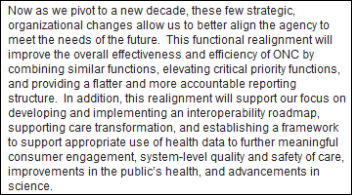Thank you for the mention, Dr. Jayne — we appreciate the callout, the kind words and learning more about the…
Monday Morning Update 6/2/14
Top News

From Anonymous Tipster: “Re: ONC reorganization. Looks like the current leadership is basically staying in place. Flattening of the structure and some folks got big promotions. Rearranging deck chairs on the Titanic?” An internal email to ONC staffers from Karen DeSalvo announces that the following will serve as ONC’s leadership team along with Deputy National Coordinator Jacob Reider, MD:
- Office of Care Transformation: Kelly Cronin
- Office of the Chief Privacy Officer: Joy Pritts
- Office of the Chief Operating Officer: Lisa Lewis
- Office of the Chief Scientist: Doug Fridsma, MD, PhD
- Office of Clinical Quality and Safety: Judy Murphy, RN
- Office of Planning, Evaluation, and Analysis: Seth Pazinski
- Office of Policy: Jodi Daniel
- Office of Programs: Kim Lynch
- Office of Public Affairs and Communications: Nora Super
- Office of Standards and Technology: Steve Posnack
It’s not uncommon for a new leader of an organization to restructure the org chart, so I don’t read too much into that. I do wonder with provider pushback on the fading Meaningful Use program whether ONC will retain its influence and keep all its people busy. Government agencies never just go away on their own – they always find ways to survive and try to keep their funding. ONC is part of HHS, which is swollen with so much bureaucracy that nobody’s going to notice ONC’s little corner of it, but other than cheerleading for EMRs, RECs, HIEs, and other big ideas whose funding (and thus interest) has expired, what will ONC’s couple of hundred employees work on?
Reader Comments
From Anonymous Tipster: “Re: VA. My prediction: The VA and DoD will eventually decide to use a commercial vendor for a combined EHR (with a multi-billion dollar price tag) and Epic will ultimately win the bid. With the forgone conclusion of the Shinseki resignation now a reality, I am wondering if there are any implications for the VistA EHR system used by the VA. While the VA OIG report points to serious problems with the scheduling system, at last year’s summit of the Open Source Electronic Health Record Alliance (OSEHRA), Stephen W. Warren, executive in charge for information and technology at the VA, bragged about the scheduling system. The whistleblower in the case is pointing out some of these technology deficiencies and it seems that VistA could wind up being a tech fall guy for some of the VA’s problem. The VA inspector general has reported that an audit by an outside accounting firm revealed continuing problems protecting mission critical systems. Many of these problems rise from the fact that VA hasn’t instituted security standards on all its servers and systems. Remember back in 2009 when the VA canceled its patient scheduling system — dubbed the Replacement Scheduling Application Development Program — after spending $167 million over eight years and failing to deliver a usable product.” I agree that the VA scandal will blacken VistA’s eye along with the VA’s ability to run big software projects since people are starting to notice the VA’s scheduling history. On the other hand, DoD is a black hole of wasted taxpayer dollars. I think it’s safe to say that giving either agency a bunch of money for software in any form is likely to result in the usual budget overruns, missed dates, internal mismanagement, and a poor ROI when considering veteran/service member outcomes. Epic might be a safer choice, but those ever-present beltway bandits will figure out a way to make it less functional and more expensive. Regard Shinseki, I doubt he had any personal knowledge of the scheduling issues despite ample OIG warnings (which could also be said of the President) but clearly political pressure meant he had to go.
From The PACS Designer: “Re: Windows 8.1 for free. Microsoft has announced that it will offer tablet producers Windows 8.1 with Bing for free to ensure that it’s the platform sold to new customers. With Windows 9 coming next year, they’ll be able to get their next OS on these recently purchased tablets with an upgrade offer.” I would much rather get Android for free than Windows 8.1.
HIStalk Announcements and Requests
Respondents were split on whether the Meaningful Use slowdown is good or bad. New poll to your right: how do you see Meditech’s competitive position compared to a year ago?
Announcements and Implementations
Jamestown Regional Medical Center (ND) goes live with Epic, spending $1.2 million to replace HMS.
Government and Politics
The State of Maryland says it will fund development of a replacement health insurance exchange using $40-50 million in leftover funds and Medicaid funding without tapping into federal money. The state will pay Deloitte to customize Connecticut’s exchange for its use. Maryland fired contractor Noridian Healthcare Solutions in February after the $170 million Maryland Health Connection failed immediately on its October 1 go-live. Some state legislators wonder why it doesn’t just use Healthcare.gov, with one saying, “What still is amazing to me is why they don’t go to the federal exchange, which is free and works. You still have to spend $40 to $50 million. It is still money they are spending on something they don’t have to.”
Oregon Governor John Kitzhaber says the state will sue Oracle, hoping to recover the $134 million it paid the company to develop the failed Cover Oregon health insurance exchange.
Other
UPMC finally admits that that all of its 62,000 employees could be at risk for identity theft rather than the 27,000 it announced in April as unknown hackers breached its payroll system and used IDs to file 800 fraudulent tax returns.
A Kansas urologist who is also the president-elect of the Kansas Medical Society says his practice’s biggest problem is electronic medical records. “Now, we’re basically key-punch operators, transcriptionists having to input the data ourselves. Voice-recognition software and some of those things help, but it has essentially tripled the time to complete a medical record. How do you accomplish that when we are already working 12 to 14 hours a day?” He says EMRs will shake out within 10 years, but doctors are quitting over them now.

Hurley Medical Center (MI) accidentally discloses the Social Security numbers of several employees when someone accidentally attaches an employee worksheet to a mass email about insurance.
Weird News Andy notes that Illinois closed three mental health facilities in 2012, but left behind heavy equipment, a medical specimen, and boxes of paper personnel and medical records.
Sponsor Updates
- The Advisory Board Company will participate in several events at Health Datapalooza. VP Piper Su will moderate a panel on “Creating Wellness Outside the Clinic.” Jay Nagy, associate principal of corporate strategy, will participate in a panel discussion on “Integration of Patient Generated Data into HCP Clinical Workflow to Achieve Improved Outcomes.” Jonah Czerwinski , managing director of strategic planning, will serve on a panel discussion, “Creating a Sustainable Future for Healthcare.”
- Validic will exhibit at Health Datapalooza and will announce new device integration partners.
- Michael Simon, principal data scientist at Arcadia Healthcare Solutions, provides a recap of eHealth Initiative National Forum on Data and Analytics.
Contacts
Mr. H, Inga, Dr. Jayne, Dr. Gregg, Lt. Dan, Dr. Travis, Lorre.
More news: HIStalk Practice, HIStalk Connect.
Get HIStalk updates.
Contact us online.







Tipster makes some interesting points. Vista deserves the black eye since the entire record keeping and electronic ordering work flows reduce doctors’ efficiency by 33 % at least. This was also the lament of the urologist in Kansas about EHRs in general.
To say that the scheduling modules and/or the schedulers at the VA was the problem, appears to be missing the root cause(s) that NO ONE wants to admit.
The elephant is right there in the room. It’s the EHR INEFFICIENCY, stupid, combined with the influx of cases. Of course, there are too few doctors and paraprofessionals considering the workflow inefficiencies due to Vista ordering sytems.
If doctors are seeing patients at one third efficiency, the VA would have to hire 3x more. That, my friends, will bust its budget, and will not happen.
But they will spend $ millions on a new EHR. Go figure.
#MU courtesy of #CMS and #ONC and the FDASIA Work Group conclusions:
“This product is not designed to treat, diagnose, prevent, or cure any disease” is a disclaimer I repeatedly hear on commercials for various supplements and devices, to avoid application of the F D and C Act, and the attendant FDA oversight.
If EHRs are not medical devices, and MU of the EHRs is not designed to treat, diagnose, prevent, or cure any disease, then they should be using that discalimer, no?
Or am I missing something? Just wondering.
Anon Tipster: Re: VA:
To my knowledge, we have not heard from any hardhats here, are there any in the group that read this blog?
1. VistA is not a bad product but poorly implemented security can actually kill people. When CBS did its segment (and there were screen shots), I noticed there were two (2) date fields? (again I need a hardhat’s input) … shouldn’t that workflow override be security driven?
As to the VistA/DoD EMR enterprise solution, and all those who are vying to replace it… Hit the pause button, take a deep breadth, take the money out of the equation (maybe, in order to replace the VistA/DoD system, the winning bidder is the one who will PAY the most, yes that’s right, the replacement winner will PAY the USA to replace the system, and not the other way around (how many folks would be left at the table?), and have a national discussion. This is a can of worms, this is a genie in the bottle problem.
We could use a separate space for this discussion.
Re VA, Vista scheduling system.
As in politics, the root problem is greed and corruption. Not the technology.
” An incompetent man blames his equipment”.
Nothing will change by swapping out the technology.
ONC changes.
With the $30 billion almost gone, the entire process delayed several times, the department budget is probably going to be cut back, so what will ONC do?
Remember Dr. M’s great plan…charge a big ONC fee to vendors to get certified. His justification was all the good things ONC has done to make software so much better. And competition will force vendors to get certified (not to mention HIPAA) …soon the certification money will be flowing in…cha ching!…
Jees, they sure have a lot of leaders at ONC.
What are they all doing, exactly, besides “chearleading’?
It would appear that they are devoting great effort to fend off the inevitable oversight that HIT needs top go to a safe and cost effective level.
I find your blog to be extremely informative.
Easy to say the VA should implement a new EMR to fix all ills. Kind of like everyone getting excited about the latest wonder drug. Core issue here seems to be about measures and accountability. I don’t think Epic or any other EMR magically fixes that.
Are there any metrics showing improved otcomes or reduced costs from the HITECH program?
Are the costs of HIT and associated infrastructure, consultants, etc included when the experts make statements on what health care costs?
Who has benefitted from HITECH besides the vendors, if you know?
The only real beneficiaries of HITECH are the vendors. HITECH effectively raises costs to health care institutions that eventually pass those costs on to the patient through higher premiums for their insurance. Patients see very little in terms of positive benefits. Patients may get more access to results through patient portals, but patients really don’t care about this. For billions of dollars spent on MU, this is very little benefit. It would be nice to see Karen DeSalvo expose MU for the vendor scam it really is.
VISTA, even with its numerous warts, is arguably the best EHR in the US. That includes Epic. The problems there have nothing to do with technology and everything to do with care resource rationing on a fixed budget. What we’re hearing from the VA has happened in places like UK and Canada for years. It’s just that this time it’s our veterans who are suffering.
@Jan Martinez: From the ambulatory standpoint, practices that already had robust interoperable EHRs benefitted from HITECH. In my organization, Stage 1 was a slam dunk as was most of Stage 2. It helped us recoup money spent years ago, although there have been a few hiccups along the way and a bit of extra work. I’ve also seen practices who hadn’t done EHR due to cost have a decent benefit, especially if they played the game under Medicaid rules, but only if they chose a good product and had strong skills to standardize and create efficiencies along the way.
I agree with El Jefe, the root of this issue is not technology and assuming so would miss the point entirely. Using technology to address the problem of scheduling is a safe bet, whether it is Cerner or Epic, but I am mostly concerned that the scheduling debaucle is just the tip of the ice berg for an organization that appears to be operating outside the context of what is reasonably considered safe or even legal. Seriously?